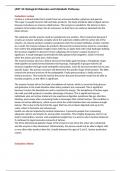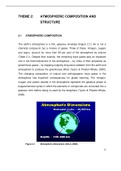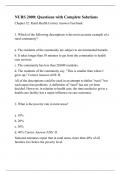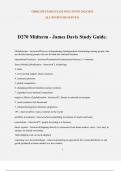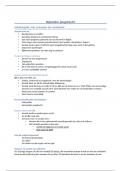Problem A discrepancy between the perceived and desired situation or development
Messy problem These are interconnected, systemic (difficult to manage) and have high levels of
uncertainty
Frames Structured ways of thinking that simplify and guide our understanding of reality
affected by expertise, experience, motivation and context
Heuristics Op een systematische en methodische manier problemen oplossen
System 1 Well-learned, partially unconscious, parallel processing of information
System 2 More developed mental structure that directs our attention to those activities
that require more information processing effort (limited capacity)
Procrastination Postponing any action to change the situation (uitstellen)
Buck passing Shifting responsibility to others in the organization
Bolstering Denying the relevance of any information that would show something is wrong
CHAPTER 2: INTERVENING IN MESSY PROBLEMS
Persuasion tactics The leader collects arguments in favor of a preferred course of action, and looks
for other stakeholders who support his or her point of view
Edicts tactics A directive (richtlijn) is given (most frequently used and least successful)
Benchmarking Reason for taking action should be known and accepted by all concerned,
tactics current performance is compared to desired performance (most successful)
Participation tactics Four different forms of participation:
- Comprehensive (stakeholders fully involved and full responsibility in decisions)
- Complete (all interested parties involved, more limited role in decision-making)
- Delegated (selecting specific stakeholders who make full decisions)
- Token (limits both number of parties involved as well as their say of solutions)
Procedural justice When participation in decision-making is increased and leaders show genuine
consideration of the input of stakeholders, those involved experience the
process to be fair, have greater commitment and develop trust
Interventions Procedures to improve processes of any kind (designed activities carried out
with groups to help achieve certain organizational outcomes)
List-based methods Elicit information using for instance brainstorming or nominal group technique.
Information is then grouped into categories and voting may be used to identify
preferences for problems or solutions (supported by computers)
System-based Elicit information can best be brought together in models (GMB) built with
methods stakeholders/experts capturing analysis of problem up to that moment, looking
at causal relations (models serve as a visual memory and as an analytic tool)
Narrative-based Elicit ideas and data in a number of ways integrating information in narratives
methods (verhalen), MSD is one of these methods with different possible futures
Decision-based Elicit opinions and data integrate information in models and matrices, MCDA
methods confronts options and criteria for instance
Project charter This is a good way to summarize project activities for the whole intervention (or
parts of it): objectives, products, activities, critical success factors, scope and
participants
ABCD weekreport achievements, benefits, concerns and what to do next
, CHAPTER 3: INTERVENTION CONTEXT
Intake This is the first phase of an intervention, making an inventory of problem
symptoms. Four important goals:
- Clarify the issue to be addressed in the project
- Manage client expectations
- Agree on roles and responsibilities of both consultant and client
- Agree on a design and deliverables of the project
Underpromise and Exceed customer expectation by delivering more value in the intervention than
overdeliver’ formally contracted, even if the client has not asked for this (all parts of
intervention can potentially add value to the client environment). Important to
make this (implicit and explicit) added value tangible for yourself, the consultant
team and the customer
CHAPTER 4: INTERVENTION PROCESS
Expert consultation Expertise is content knowledge. This is needed if the client knows the problem
(advisor role) and communicated it to the consultant, who in turn has information to solve it
Doctor-patient model Expertise is diagnosis. Client does not know the exact problem, but reveals all
(advisor role) relevant information and consultant diagnoses and prescribe the situation
Process consultation Expertise is methodology. Client and consultant analyse the situation together.
model (advisor role) Client does not know the problem exactly and what kind of help is available
Facilitator A person who helps a group in working on its task, by focusing on process but
not on content
Attitudes Helping, being neutral and enquiring (vragen stellen, actief luisteren en
reflecteren om miscommunicatie te voorkomen)
Neutrality Refraining from voicing an opinion on the content of the problem. Reasons:
- You cannot be sure (especially in messy problems) that your opinion is correct
- Evaluating input of participants will impede the free flow of information
- Facilitator has active rol in determining how the group does its work
Blockages of open - Tendency to judge or (dis)approve what other people say
and free exchange of - Many people find it difficult to listen (requires concentration and conscious
information choice to keep own opinion out of process as much as possible)
- Defensiveness in organizations as well as in daily life
Intervention cycle 1. Diagnosis (description of symptoms and causes)
(De Leeuw) 2. Design (formulating and choosing solutions to implement)
3. Implementation (actual implementation of changes)
4. Evaluation (results/effects of the changes)
Group tasks - Surfacing and sharing knowledge and interpretations of key issues
- Identifying commonalities in views, form a consolidated perspective and work
out a solution that integrates the various position
- Prioritize ideas
Divergence Stops the group from missing important facts or opinions and achieving a
premature (= te vroege) consensus (prevents potential problems)
Convergence Transforming a large set of ideas into a smaller set (look at what is relevant)

